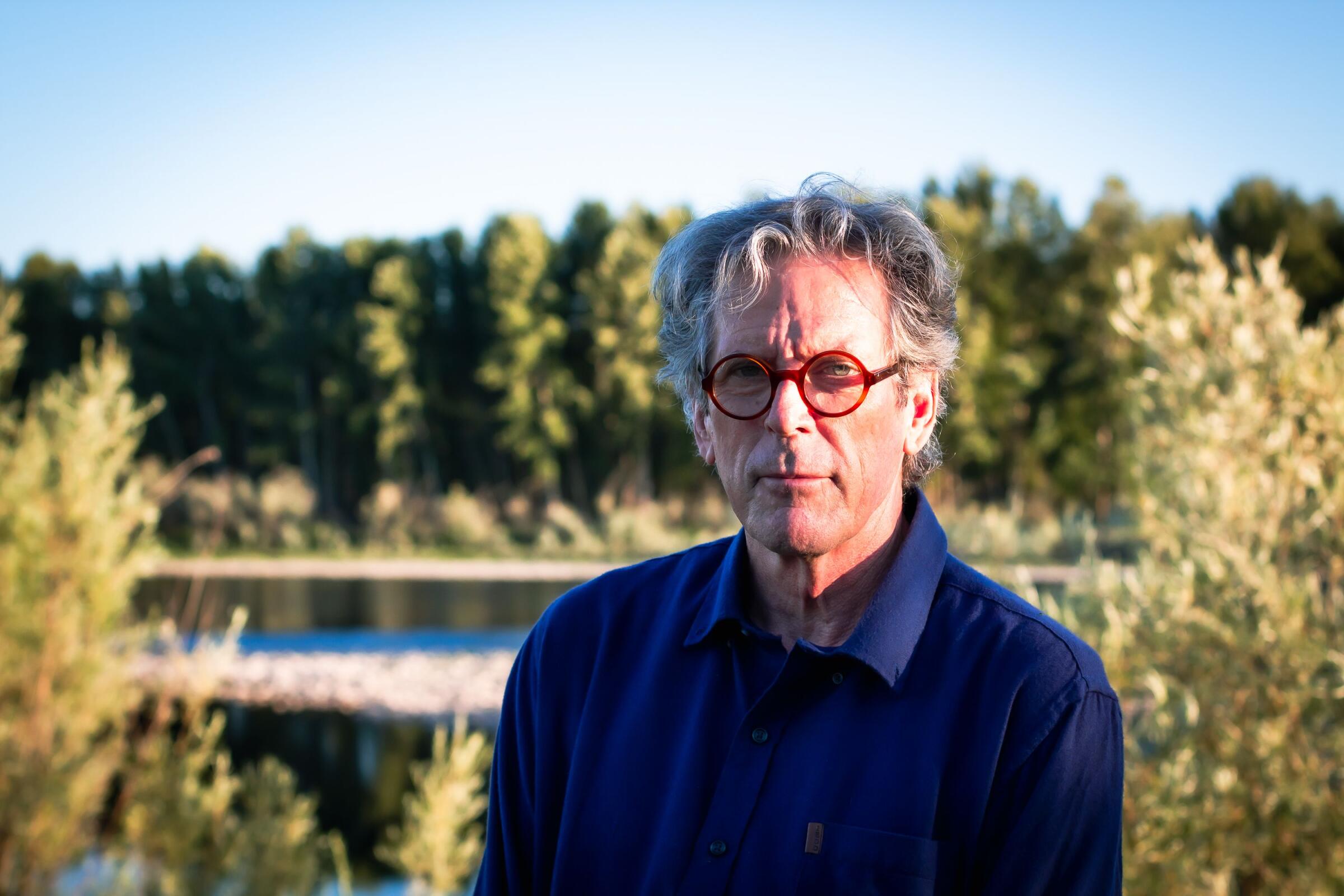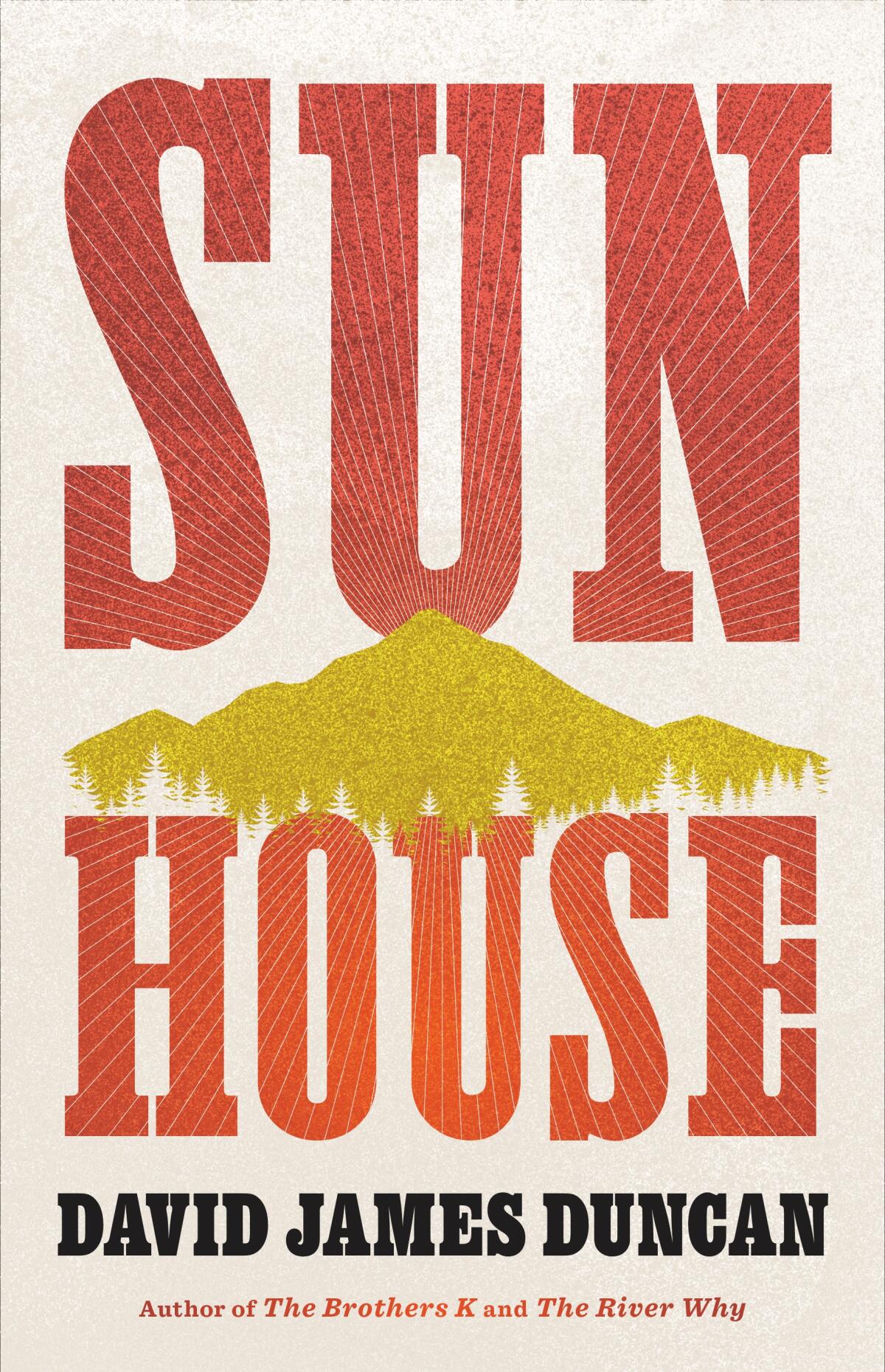Sign up for our Book Club newsletter
Get the latest news, events and more from the Los Angeles Times Book Club, and help us get L.A. reading and talking.
You may occasionally receive promotional content from the Los Angeles Times.

On the Shelf
Sun House
By David James Duncan
Little, Brown: 784 pages, $35
If you buy books linked on our site, The Times may earn a commission from Bookshop.org, whose fees support independent bookstores.
New Year’s Eve, 2007: Twenty-five years old and single, I spent the winter alone in a former Forest Service cabin in the North Fork of Montana’s Flathead River across from Glacier National Park. Instead of making the hourlong drive to the town of Whitefish to celebrate the holiday, I stayed in the cabin; I was too engrossed in David James Duncan’s 1992 bestselling novel, “The Brothers K.” Although it had been at least a week since I’d seen another human, the Chance brothers — and Duncan’s update of Dostoyevsky by way of baseball — kept me company.
Although I no longer live off the grid, I have carried on as a bona fide member of the growing cult of Duncan. His early novels, beginning with 1983’s “The River Why,” illuminate the connection between the natural world and spiritual longing. Over four decades he has also written acclaimed nonfiction: essays like “Bird-Watching as a Blood Sport” and “When Compassion Becomes Dissent”; books including “River Teeth” and the National Book Award-nominated “My Story as Told by Water.”
This week, Duncan has a new novel, “Sun House,” which took 16 years to complete. Weighing in at close to 800 pages, it feels both capacious and tightly packed, as musical and shimmering as its title suggests. It is the product of long workdays, seismic struggles both personal and global — and a level of compassion and spirituality that transcends all of it. Like “The Brothers K,” it is difficult to put down.
John Perlin’s sweeping, civilizational history ‘A Forest Journey’ is being revived by Patagonia, the Ventura-based outfitter’s publishing imprint.
On a hot July morning in Missoula, I paid Duncan a visit. The 71-year-old writer, activist, expert fly-fisher and new grandfather welcomes me into his town home, just 50 steps from Rattlesnake Creek, to discuss what Michael Pietsch, his editor at Little, Brown, calls his “magnum opus.” “Sun House” is Duncan’s seventh book, an epic tale spanning the lives, heartaches and triumphs of a menagerie of characters committed to building a loving community in contemporary America. Its narrator, nicknamed the Holy Goat, incorporates journal entries, letters and song lyrics into the story of how such disparate people, all nursing wounds psychic and physical, migrated to the Montana ranch where they established Elkmoon Beguine & Cattle Company and found a new way to live.
Seated on his sofa in a button-down shirt, worn Levi’s and blue-rimmed round glasses, Duncan offers me a chair and keeps distractions at bay, at one point muffling his ringing cellphone with a throw pillow. Although he’s lived in Missoula for 30 years, he’s recently moved into this creekside home following a divorce and a few difficult years. He wrote “Sun House” in part as an ode to his two 30-something daughters, Celia and Ellie — and more broadly to the next generation.
He wrote it, he adds, for “the young, who so many in our anti-culture have betrayed and abandoned, apparently preferring guns, belligerence, destructive work and an unimaginable future.”
In the novel, formatted to echo sacred texts in its “tellings,” eight main characters include Risa McKeig, a Sanskrit student, and Lorilee Shay, who plays the mountain dulcimer. These two become “Sun House’s” electric connecting characters. They were modeled on people Duncan knew. “I was determined to depict the strong women I actually know, including my daughters,” he explains.
The prolific novelist wrote “Perestroika in Paris,” about a horse and a dog in France, because it was soothing to focus on “kindness and trying to get by.”
“Sun House” is more expansive than that, however; like the ranch at which his flock gathers, it’s a container for all the subjects Duncan has studied through the years — and also, in its earnest search of transcendence and love, a rebuke to the despair, division and distraction that afflicts his home state and country. And its foundation is compassion.

It is unsurprising but still striking to witness in person just how invested Duncan is in his work. He speaks through heavy pauses, and when he reads certain passages of the book aloud, tears well in his eyes. His characters feel as real as the gurgling Rattlesnake beside us, but they are also manifestations of all he’s witnessed over decades of writing, teaching and environmental activism.
In 2012 he and fellow Montana author Rick Bass wrote “The Heart of a Monster,” a work of storytelling protesting the attempt to create an industrial corridor connecting the Alberta Tar Sands to Asia via highways and barge routes following Montana’s vital rivers. Duncan touts the project’s failure as a victory for civil resistance. And he echoes the experience in a plotline of “Sun House,” in which Kale, a Montana ranch foreman, fights a land grab that would turn pristine wilderness into a nature park for the ultra-wealthy.
“[E]very place with anything right about it goes to hell as soon as it falls into the hands of these multinationals,” Kale says. “The one way to preserve and defend a place’s rightness is to inhabit it, intimate, knowledgeable, and vigilant as can be.”
Always flowing beneath the currents of the plot is spirituality, worked in via snippets of mysticism, poetry and music, including blues and folk. First among equals is the verse of the Zen poet Gary Snyder. One chapter, titled “Second Telling: The One-Book-of-Poems-Long Marriage,” originally a discrete novella, was such a direct homage that he sent it to Snyder, telling him he “wanted to depict how deeply poetry entered some people.” Snyder responded, “that was a lot of fun,” Duncan recalls. “He then let me quote ‘Axe Handles’ to my heart’s content, gratis.”
In “Such Kindness,” Andre Dubus III (“The House of Sand and Fog”) focuses on a laborer who spirals downward after being addicted to opioids.
Suffering trails Duncan’s characters into their new lives. The mother of Jamey Van Zandt died on his fifth birthday; Risa has been permanently marked by her parents’ divorce; Grady Haynes reached the heights of success as a software executive but lost his sense of purpose.
Some of these elements are also drawn from life. “I went through what might be the worst heartbreak of my life when I was wrapping up the first draft about four years ago,” Duncan says. “I lost my home and my marriage.”
Duncan and his wife divorced — a rupture that also resulted in a life-changing revelation. He realized that all those years working in his study, feeling sick and using an inhaler, he had been allergic to the horses on their property. After he moved to this quiet, tree-lined neighborhood just north of downtown Missoula, his health improved.
“I left and gained a huge amount of energy and lung capacity,” he says, “and could see the work I’d been doing all those years objectively.” He went back to his magnum opus, “Sun House,” and “reread the book from Page 1 over the course of about 2½ years, editing like crazy, making improvements and deletions by the thousands.”
“Sun House” offered Duncan a place to heal and recover from his heartbreak — or as the Holy Goat would call it, a “heart-wound.” All the novel’s wounded undergo difficult acts of healing through sacrifice — hiking in the mountains to a sacred lake, preaching “Dumpster Catholicism” to Portland’s unhoused. Or as Jamey summarizes it, “Light the lamp and do the damned heartwork.”
McMurtry, who died last week, made it his mission to redefine Texas as a crucible of modern conflicts. His early novels succeeded stunningly.
Their individual journeys eventually lead to Elkmoon Beguine, an intentional community of ranchers, musicians, poets and restaurateurs. Duncan is an ardent fan of the Beguines of medieval Europe, lay religious communities of women who led contemplative lives without joining an approved religious order. But his lay order is a deliberate hodgepodge of the ideas Duncan has studied for much of his life: the works of 14th century German mystic Meister Eckhart; the Japanese Buddhist Eihei Dogen; the sacred Vedas of India. “Sun House” includes an annotated bibliography.
The spiritual elements of the story provided Duncan with his own transcendent experience. “Working on ‘Sun House’ became as literal a refuge for me as the Elkmoon Beguine & Cattle Company,” he says. “I was the first person their community protected.”
Doherty is a writer, opinion columnist and book reviewer who lives in Kalispell, Mont.
Sign up for our Book Club newsletter
Get the latest news, events and more from the Los Angeles Times Book Club, and help us get L.A. reading and talking.
You may occasionally receive promotional content from the Los Angeles Times.